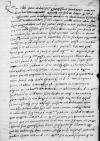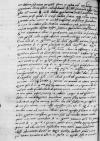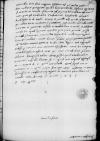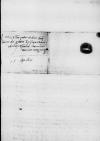Quanta me laetitia ⌊⌋ Reverendissimae Dominationis Vestrae affecerint, cum intelligerem eandem in coadiutorem ⌊episcopatus Warmiensis⌋ tandem electam, scribi nequit, multo minus eidem satis digne congratulari, vel ipsi potius ⌊Prussiae⌋ ac toti ⌊Poloniae⌋ possum, quae eam nacta praesulem, qui non solum domi consilio, prudentia et auctoritate sua, verum etiam apud exterarum nationum ac totius Christianitatis principes et monarchas summos, si aliqua ingrueret necessitas, quod aliquando, quod nolim, fieri possit, illi multum prodesse et ab omnibus imminentibus periculis liberare potest. Apud quos quantum, et praecipue apud serenissimos ⌊Romanorum regem⌋ et ⌊imperatorem⌋, Dominatio Vestra Reverendissima possit, cum antea ex scriptis illorum, dum inutilis servus Dominationis Vestrae Reverendissimae essem, cognoverim, tum praecipue, cum cum domino ⌊Fabiano⌋ in aula utriusque essem, a plurimis summis viris audivi nullum ex omnibus aliorum principum et regum oratoribus ita acceptum et tantae auctoritatis apud imperatoriam maiestatem fuisse, neque hodie esse quemquam, ut Dominatio Vestra tunc temporis fuerit et adhuc, etiam absens, est.
Optarem et maximopere aliquem ex malevolis detrectatoribus et calumniatoribus Dominationis Vestrae Reverendissimae spectatorem et auditorem summae laudis et numquam intermoriturae gloriae eiusdem in tam longinquis et variis regionibus apud summos infimosque partae affuisse, profecto non dubitarem eum cum aliis omnibus ultro sine omni mora veniam malignitatis et calumniarum supplices a Dominatione Vestra Reverendissima petituros.
Quod ad me attinet, quas exiguitas mea potest Dominationi Vestrae Reverendissimae pro tanta sua benevolentia et gratia, qua me homuncionem immeritum cum praesentem, tum etiam absentem suis gratiosissimis litteris prosecuta est, immortales ago gratias habiturusque, dum vivam.
Missa mihi nuper est pecuniola quaedam a ⌊patre⌋ meo, ut Dominatio Vestra Reverendissima scit, et una scriptum, quod ea me debeam sustentare per annum istum, et postea, nisi res aliter citra gravamen illius ferret, redire domum, se enim plurimis aliis liberi[s], quibus non minus, quam mihi debeat, gravatum nihil amplius mih[i] mittere posse. Quod cum ita se habere sciam neque velim antea gravato plus oneris et molestiae afferre, consilium secundum tempus et modum facultatum ineundum erit.
cf. Hor. Epist. 1.1.15 ⌊Quocumque me rapiet tempestas, deferar hospes.cf. Hor. Epist. 1.1.15 ⌋ Interim secundum consilium Dominationis [Vestrae] Reverendissimae Horatiani illlius et, quod antea parietibus inscribere sole[t], nunc, quod sibi velit, re ipsa edoctus, memor, meo me metiar pede.
Cum autem Dominationem Vestram Reverendissimam nec non dominum ⌊agnatum meum⌋, singulare[m] servitorem Dominationis Vestrae Reverendissimae, plurimos in aula serenissimi ⌊Romanorum regis⌋ amicos et dominos, quod Dominationem Vestram Reverendissimam plurimum colunt et observant, et dominum agnatum favore et benevolentia complectuntur, habere non igno[ro], maxima teneor spe me facile per intercessionem eorundem, quo[d] iam antea a Dominatione Vestra Reverendissima factum est, locum et condiciunculam aliquam obtenturum. Neque Dominationem Vestram Reverendissimam fugit, quid favor et promotio istis in locis, ut ubique possit, et occasionem se offeren[tem] non spernendam, quae per utrosque maxima videtur dari, facillim[e] id expediri posse, cum nihil aliud, quod ad gratiam et benevolentiam utriusque accedat, quam parum atramenti et chartae opus sit.
Quare cum Dominatio Vestra Reverendissima domino ⌊agnato meo⌋ scribet, ut aliquam de hoc meliori modo, quemadmodum optime novit, mentionem facere et rem ipsam postea, si utrique ita videbitur, exequi et ad effectum deducere non dedignetur, humillime precor, salvo tamen meliori iudicio et consilio utriusque. Quibus me omnino subicio, quicquid enim de me statuerint, mihi iussa capessere fas est etc.
Quod Dominatio Vestra Reverendissima reculas meas ab interitu liberari fecerit, agnosco solitam et ineffabilem gratiam eiusdem, quod curam suam ad reculas etiam meas parvi momenti extenderit Dominatio Vestra Reverendissima.
Statum rerum hic pauc[is] accipiat Dominatio Vestra Reverendissima. ⌊Caesaream maiestatem⌋ brevi ⌊Italiae⌋ appropinquatu[ram] fertur ad obviandum insultibus ⌊Turcharum⌋, quos maxima classe adventuros dicitur, et ⌊regis Galliae⌋. Habuit ⌊maiestas eius⌋ per totam hiemem et adhuc in ⌊Italia⌋, in oppido ⌊Ast⌋ et circumiacentibus locis, satis magnum praesidium ad 16 millia peditum, duo millia et quingentos equites levis armaturae. Supremus capitaneus est ⌊Marchio de Guasto⌋.
⌊Florentia⌋ ab imperialibus adhuc obtinetur, inter quos est ⌊cardinalis Tridentinus⌋, cardinales ⌊Salviati⌋, ⌊Rudolphus⌋ et ⌊de Gadis⌋, ⌊Strocii⌋ et multi alii exules ⌊Florentini⌋, qui caelum terra mixturos se putabant, post multas hinc inde machinationes et practicas, infecta re, tandem huc venerunt et ad duos menses hic apud legatum nepotem ⌊pontificis⌋ fuerunt. Missa sunt ⌊Florentiam⌋ tria millia ⌊Hispanorum⌋, mille et quingenti ⌊Germani⌋ milites. ⌊Veneti⌋ dicuntur se bene pro ⌊imperatore⌋, quantum ad ⌊Turcham⌋ attinet, gerere et tribus illius legatis tale responsum dedisse, quod non satis bene contenti discesserint.
Vernum hoc tempus mirabilia secum afferet. Deus Optimus Maximus omnia ad bonum finem deducat.
⌊Campensis⌋ adhuc ⌊Romae⌋ persistit apud cardinalem ⌊Contarinum⌋. Misi ⌊illi⌋ ⌊⌋ Dominationis Vestrae Reverendissimae. Ubi aliquid responsi ab ⌊eo⌋ recepero, Dominationem Vestram Reverendissimam non celabo.
Quod superest, me in gratiam Dominationis Vestrae Reverendissimae, quam Deus Optimus Maximus Nestoreos in annos felicissimam conservet et prosperet in omnibus, humillime commendo.



